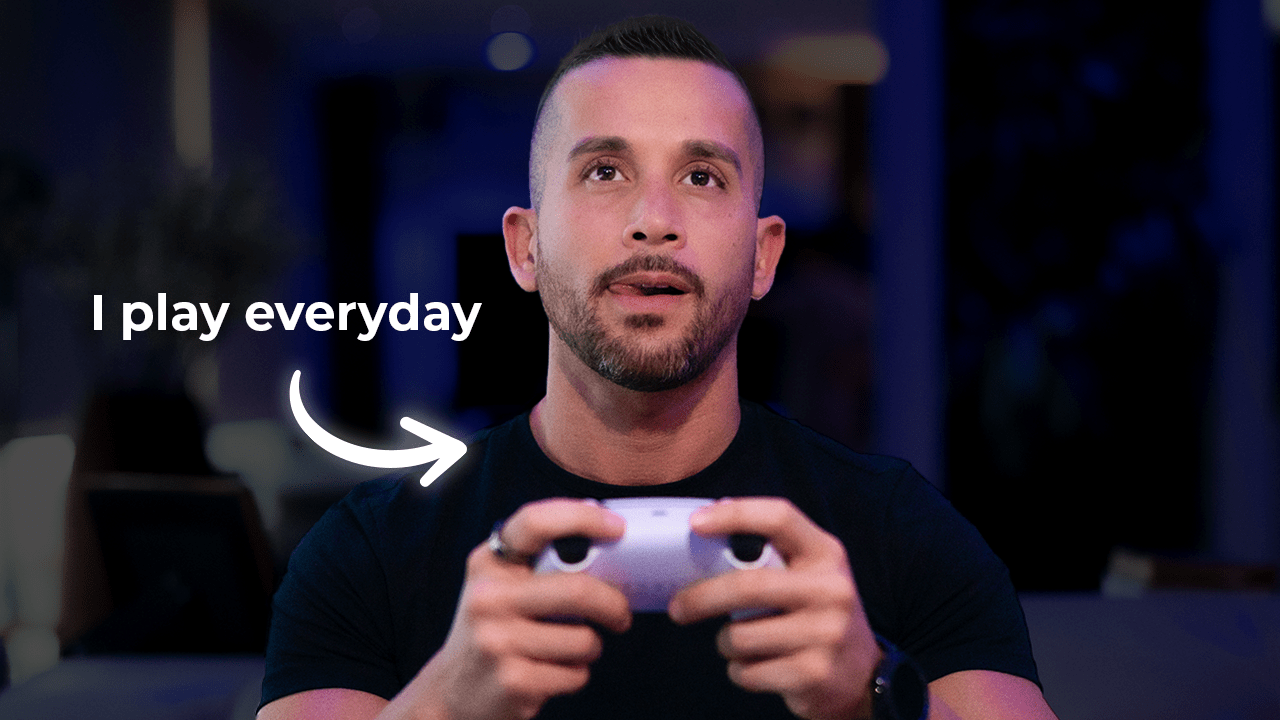3 Tricks Modern Videogames Use to Create Addiction
- Written by NelsonQuest
- November 24, 2022
Table of Contents
I have a weird relationship with video games –
On the one hand, they’ve given me a deeper understanding of complex themes like friendship, love, and purpose, as well as unique insights into many of the models and archetypes that have largely shaped who I am today.
On the other hand – there have been many times… TOO many times… where instead of advancing my life or career – I was farming virtual gold until 5 in the morning.
Video game addiction is now such a massive global problem that in 2019, the W.H.O officially added a new disorder to its list:
“Gaming Disorder”… which is roughly summarized as “an impaired control and over-prioritization of gaming despite the occurrence of negative consequences”

And while we most often think of people with ‘gaming disorders’ as overweight neckbeards still living in their parents basements.
The “real” gaming addicts are actually just normal, everyday people – mostly in their 20’s and 30’s – who have become involuntarily enslaved to an artificial stimulus that is designed to keep us addicted.

In this article I’ll be focusing EXCLUSIVELY on the negative aspects of video games, and what makes them so uniquely addicting in an age of endless distractions.
#1: Our Reward System Loves Instant Gratification
Most people mistake “dopamine” as something that makes us ‘feel good’.
In reality, dopamine is actually responsible for motivating us to take action in anticipation of the thing that makes us feel good… “the reward”
When we feel the urge to play video games, dopamine is actually the thing that MOTIVATES us to pick up the controller –
Now the problem with dopamine is that it doesn’t distinguish between ‘good rewards, which are usually ‘long term’ in nature – and ‘bad rewards’ which are normally ‘short term’ or ‘instat’ ’ in nature – neurologically, they’re both just “rewards.”
And so when presented with the choice of getting an INSTANT reward by playing video games, or working towards a long-term reward by training our bodies or building a business…


Well, this is why it’s so RIDICULOUSLY easy to prioritize gaming over studying –
Trying to manage video game play time is like buying a pack of oreos and intending to just eat one a day… good fucking luck.
As long as our video games are accessible within our immediate environment – It takes a TREMENDOUS amount of conscious energy and discipline to be able to effectively manage how much we play.
And to make matters worse – there’s almost 0 friction to go from the ‘idea’ of playing video games, to ‘actually’ playing them.
My Playstation 5 now loads up so fast that from the moment that I have the ‘idea’ to play Spiderman – I can be playing within a few seconds.
…I can open up Candy Crush on my phone just as quickly as I can open up Instagram.
#2: Video Games are Supernormal Stimuli
In call of Duty.. We’re a highly trained soldier…
hunting down terrorists and expertly maneuvering around obstacles while executing strategies with our teammates –
In reality… we’re just pushing buttons on a controller.
This is a great example of how videogames are a “Supernormal Stimuli” – let me explain.
All living creatures have built-in programming to react instinctively to certain stimuli –
A supernormal stimulus is an artificially exaggerated version of a normal stimuli, that produces a GREATER response.

An example of this is junk food, which is an artificially exaggerated stimulus of REAL food.
Or porn, which is a supernormal stimulus of human reproduction.
And so videogames… well.. They are LOADED with supernormal stimuli –
Call of Duty and Halo are so rewarding because they closely mimic the activity of hunting.
And the The humans, Zombies and monsters we find in these games are all artificial exaggerations of predators –
Sports games like Fifa and NBA2k21 are evolved simulations that mimic hunting and battle skills –
MMORPG’s like World of Warcraft simulate an exaggerated sense of progression by including ranking systems, rare equipment, and achievements –
And unlike real life where ‘progression’ takes real time and effort.
In video games, in just a few hours we can go from a weak puny nothing, to a legendary hero.
All of this is tied into primitive desires where the best hunters and the most accomplished members within groups had better access to resources and potential mates.
Even the upgraded gear that we purchase is tied into our innate desire to appear accomplished within society… even if it’s a virtual one.

Get the Dark Mode guide

The Dark Mode Guide
is a simple system designed to help you achieve a specific goal by facilitating the development of relevant habits and creating the perfect environment to make failure impossible.
This guide is about actually walking the path. It creates a perfect environment devoid of excuses and forces you to face who you are and what you need to do in a way that’s sustainable.
#3: Video Games Use Operant Conditioning
This is a Skinner Box. A Skinner Box usually has a button or lever that activates a food dispenser.
It was designed by Dr. BF Skinner to research how he could change an organism’s behavior using rewards and punishment – a learning process that he dubbed ‘Operant Conditioning.’

Now, what does this have to do with video games?
Dr. Skinner made a lot of important observations – 2 of which are critical to understanding why video games are now DELIBERATELY addictive.
Observation 1: Rewards can be used to create addiction
Almost every game on the market is now OVERFLOWING with rewards –
We gain experience points, loot, and virtual money for every monster we defeat,
We get rewards for unlocking new skills, recipes, and equipment.
In a lot of games, we even get rewards JUST for logging in every day.. In some cases we get rewards for getting a certain number of rewards! …This is WAY better than real life!
Former Ubisoft Research Scientist Nick Yee famously conducted studies that demonstrated how the more hours that we spend playing video games,
the more self achievement we begin to derive from video games INSTEAD of real life…
By LEVERAGING these systems of seemingly unending rewards, video games are starting to look more like Skinner Boxes than harmless sources of entertainment.


Observation 2: RANDOM rewards are even MORE addicting
We release much more dopamine when rewards are random…
This is why slot machines are so popular in casinos. Because of this, we’ve seen an unprecedented rise in “Gacha” type games.
Gacha is short for ‘Gachapon’ – which are very popular machines in Japan where people put money in hoping to score a rare toy.
Gacha-gacha the sound of the machine being cranked – and “Pon” is the sound made when you take the capsule out.
If you take a look at the Google play store on Android, or the App store on Ios – you’ll find THOUSANDS of Gacha games.
Where the ENTIRE point of the game is to spend real money on ‘loot boxes’, ‘crates’, or ‘wishes’… that MIGHT contain stronger equipment and heroes.
Players can never directly buy the items themselves… they can only offer up their money and pray to the gacha gods that today is their lucky day.
A lot of these games are disguised as RPG’s or Card games – The reality is that they’re just glorified slot machines, and what players THINK is a GAMING addiction, is actually a GAMBLING addiction.
My Method
Alright guys – everything described in this video is exactly why I tend to avoid most online shooters, MMORPG’s, and especially mobile games.
Here’s an easy trick that will help you identify games that are intentionally DESIGNED by be addicting – something that they ALL have in common –
They don’t have ‘game over’ screens… or for that manner any other ‘stopping cues’ that give us a pause to decide whether or not we want to keep playing.
My favorite thing to tell people when they ask for advice on managing video games is this: avoid games that don’t have an ending.
Anyway – as for me – I only play role-playing games – more recently – The Witcher 3 and Persona 5 Royal and 13 Sentinels.
And indie games, like Journey, Celeste, and Gris…
Generally speaking, I tend to gravitate towards games with rich stories, deep characters, and unique experiences –
And I also have a rule for myself where I can only play video games while I train on my bicycle.
If you want to see first-hand how video games have influenced my life, follow me on Instagram @nelsonquest.
Stay
Updated!
Subscribe to e-mails
Join 100k+ others and receive weekly tools, tips, and secret resources directly from Nelson.



